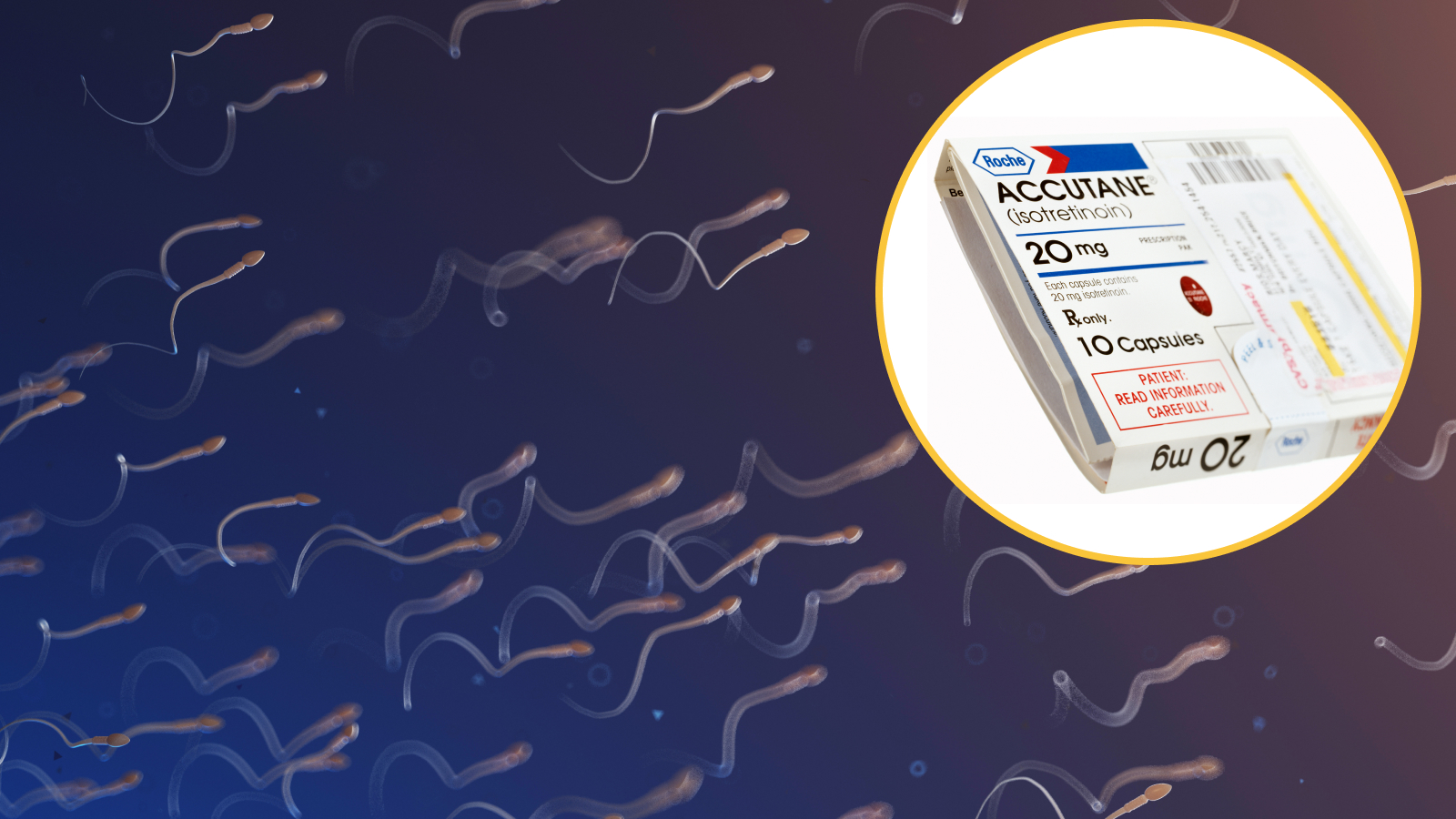Acne drug Accutane may restore sperm production in infertile men, early study hints
Accutane, a decades-old acne treatment, could help men with infertility produce motile sperm and avoid invasive sperm retrieval surgery, a study finds.

Get the world’s most fascinating discoveries delivered straight to your inbox.
You are now subscribed
Your newsletter sign-up was successful
Want to add more newsletters?

Delivered Daily
Daily Newsletter
Sign up for the latest discoveries, groundbreaking research and fascinating breakthroughs that impact you and the wider world direct to your inbox.

Once a week
Life's Little Mysteries
Feed your curiosity with an exclusive mystery every week, solved with science and delivered direct to your inbox before it's seen anywhere else.

Once a week
How It Works
Sign up to our free science & technology newsletter for your weekly fix of fascinating articles, quick quizzes, amazing images, and more

Delivered daily
Space.com Newsletter
Breaking space news, the latest updates on rocket launches, skywatching events and more!

Once a month
Watch This Space
Sign up to our monthly entertainment newsletter to keep up with all our coverage of the latest sci-fi and space movies, tv shows, games and books.

Once a week
Night Sky This Week
Discover this week's must-see night sky events, moon phases, and stunning astrophotos. Sign up for our skywatching newsletter and explore the universe with us!
Join the club
Get full access to premium articles, exclusive features and a growing list of member rewards.
The widely used acne medicine Accutane could be used to treat male infertility, a small study hints.
For men with infertility caused by extremely low sperm counts or a complete lack of sperm, the only medical option is to undergo surgery to collect sperm directly from the testicles to then use for in vitro fertilization (IVF). But this is a significant surgery that involves discomfort; potential risks, such as infection; and a prolonged recovery period. Moreover, the surgery only yields sperm about half the time.
Now, researchers are exploring an alternative: isotretinoin, better known as Accutane, a drug that has been used for decades to treat severe acne. In a small study published in July in the Journal of Assisted Reproduction and Genetics, the drug stimulated sperm production in some men who at baseline had no or very few sperm in their ejaculate.
"The idea that a well-studied drug could stimulate spermatogenesis [sperm production] in men with severely impaired sperm production is exciting because it opens the door to a non-surgical option for men who might otherwise require invasive testicular sperm retrieval," Dr. Justin Houman, an assistant professor of urology at Cedars-Sinai Medical Center who was not involved in the study, told Live Science in an email.
"That said, the study is small, preliminary, and requires replication in larger, randomized trials before we can consider it a true breakthrough," said Houman, who is also the chief clinical officer at Bastion Health.
Dr. Brian Levine, the founding partner and practice director of CCRM Fertility of New York, who was not involved in the study, also expressed cautious optimism about the findings.
"The prospect of helping a patient avoid the pain, recovery time, and emotional stress of surgery is a source of genuine excitement for me and my colleagues," he told Live Science in an email. But "this is not a cure-all, and there is much more research to be done," he said.
Get the world’s most fascinating discoveries delivered straight to your inbox.
Related: Man gets sperm-making stem cell transplant in first-of-its-kind procedure
So, how might a skin medication help men make sperm?
Previous studies have found that infertile men often have lower levels of retinoic acid inside their testes. This molecule, a derivative of vitamin A, is essential for the normal development of sperm cells. It controls the development of immature germ cells into mature sperm cells and facilitates the release of mature sperm into the seminiferous tubules within the testes. This link led scientists to test isotretinoin — a compound that mimics natural retinoic acid — as a potential way to jump-start sperm production.
For this study, researchers enrolled 26 men with nonobstructive azoospermia — a condition in which there is no sperm in the ejaculate due to a problem with sperm production — and four men with cryptozoospermia, in which extremely low numbers of sperm are present in the ejaculate.
All of the participants took 20 milligrams of isotretinoin twice daily for at least six months. Their blood values, hormone levels and semen were closely monitored at several time points during the study.
Of the 30 men in the study, 11 began producing motile sperm — sperm that swim efficiently — in their ejaculate. This enabled these men and their partners to start IVF without the need for surgical sperm collection. This treatment-responsive group included all four men with cryptozoospermia and seven men who had previously shown no sperm at all in their ejaculate.
For the remaining men who still lacked sperm in their ejaculate after treatment, doctors had to use surgery to collect sperm for IVF. But after isotretinoin, the procedure took far less time — 63 minutes, on average, compared with 105 minutes before treatment. (The report didn't note exactly why the surgery was more efficient after Accutane.)
At the time the study was published, nine IVF cycles had been carried out with sperm collected after isotretinoin treatment, leading to multiple healthy embryos, some ongoing pregnancies and one live birth so far, the researchers reported.
The treatment wasn't free of side effects, however. All 30 men developed dry skin and chapped lips, and about half reported feeling irritable after the treatment. Some also had rashes and elevations in their cholesterol and triglyceride levels. Because isotretinoin can these levels and liver function, patients would need regular blood tests during treatment, Houman said. When people take Accutane for acne, doctors recommend periodic blood tests, although they don't agree on how frequently these tests should be done.
"Importantly, we do not yet know the optimal dose, duration, or long-term safety of isotretinoin in men seeking fertility," he said. "Another drawback is that response rates are unknown, and many men may not benefit at all."
Until data from larger studies is available, isotretinoin shouldn't be used to treat male infertility outside of clinical trials, Houman cautioned.
For women, isotretinoin can be taken safely outside of pregnancy, but during pregnancy, it's considered highly dangerous because it can cause severe birth defects. This risk is so significant that the drug carries a black box warning and strict contraception requirements to adhere to when taking the medication.
"In men, the situation is different," Houman said. The drug doesn't appear to damage sperm DNA or pose risks to reproductive partners or the resulting children. "In fact, this new research suggests it may have a paradoxical benefit by enhancing sperm production in certain men." This highlights "the very different biological contexts" between the male and female reproductive systems, he said.
Looking ahead, the researchers hope to figure out which male infertility patients are most likely to benefit from isotretinoin; how to fine-tune the timing and dosage of the treatment; and whether the drug can improve sperm quality and fertility outcomes.
The possibility that a simple course of oral medication could restore sperm production for some men "would represent a monumental shift in how we approach male infertility", Levine said. "It offers a new layer of hope — not just the hope of finding sperm, but the hope of restoring a natural biological function."
This article is for informational purposes only and is not meant to offer medical advice.

Clarissa Brincat is a freelance writer specializing in health and medical research. After completing an MSc in chemistry, she realized she would rather write about science than do it. She learned how to edit scientific papers in a stint as a chemistry copyeditor, before moving on to a medical writer role at a healthcare company. Writing for doctors and experts has its rewards, but Clarissa wanted to communicate with a wider audience, which naturally led her to freelance health and science writing. Her work has also appeared in Medscape, HealthCentral and Medical News Today.
You must confirm your public display name before commenting
Please logout and then login again, you will then be prompted to enter your display name.
 Live Science Plus
Live Science Plus





